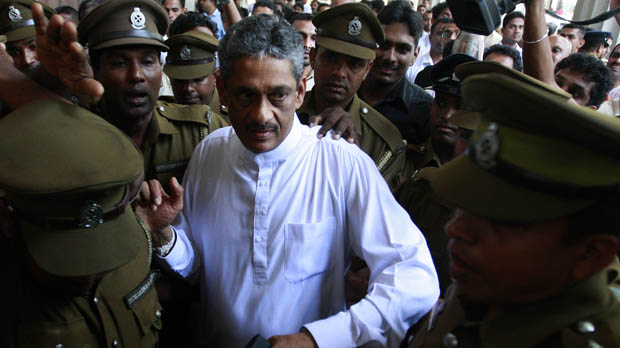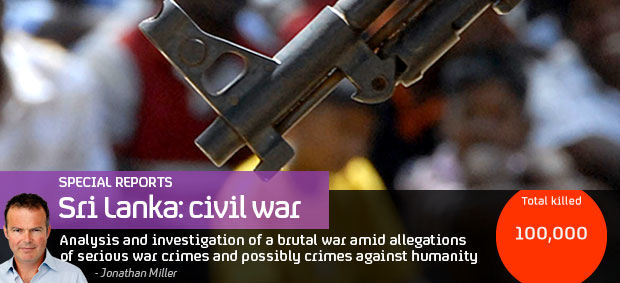Sri Lankan ex-army chief jailed for war crime ‘lies’
Sri Lanka adds three years to a former army chief’s jail sentence for “making false allegations” that the defence secretary ordered government forces to commit war crimes.

A Sri Lankan high court extended former army commander Sarath Fonseka’s sentence, finding him guilty of making “false allegations” against President Mahinda Rajapaksa’s brother, the Defence Secretary Gotbaya Rajapaksa.
Mr Fonseka had been quoted by a newspaper alleging that Defence Secretary Rajapaksa had ordered the execution of surrendering Tamil rebels in the final stages of Sri Lanka’s separatist conflict in May 2009.
A Sinhalese nationalist, Mr Fonseka led the army to victory in the war but fell out with President Rajapaksa shortly after.
The three-judge bench in a two-to-one judgement found Sarath Fonseka guilty of violating emergency regulations by “spreading rumours and causing public disorder” during the interview.
Hundreds of armed police increased security around the court during the delivery of the verdict, placing bomb-proof barricades around the complex in Hulftsdorp, Colombo.
Fonseka, who ran against President Mahinda Rajapaksa in 2010 elections, is already serving a 30-month prison term after a court martial convicted him of irregularities in military procurements.
Another court martial earlier dishonourably discharged the former general for engaging in politics while being in active service. Mr Fonseka was stripped of his ranks and the medals he earned during his 40-year career.
Evidence of war crimes
Sarath Fonseka retracted the allegations he made to Sri Lanka’s Sunday Leader newspaper and insisted he had been misquoted, writes Channel 4 News Foreign Affairs Correspondent Jonathan Miller.
But the same allegations keep on surfacing, from other senior army commanders and other witnesses to the bloody end to the Sri Lankan civil war in May 2009.
The defence secretary, who holds US citizenship, has repeatedly denied that any war crimes were committed by the Sri Lankan Armed Forces, but Channel 4 News has uncovered powerful prima facie evidence of war crimes, which senior military commanders have insisted were “ordered from the top”.
Top-level sources in the Sri Lankan military have named Gotabaya Rajapaksa as the one who ordered frontline generals to summarily execute surrendering Tamil Tiger fighters and even to kill civilians.
The verdict – which could mean that the former Sri Lankan war hero remains in jail until February 2016 – will serve to keep Rajapaksa’s former friend-turned-nemesis conveniently out of view while the regime remains under intense scrutiny over some of the most serious allegations of war crimes for decades.
The verdict will servce to keep Rajapaksa’s former friend-turned-nemesis out of view while the regime remains under intense scrutiny.
Sri Lanka’s own inquiry into events in the final months of the 27-year-long conflict between the government and the Tamil Tigers – the “Lessons Learned and Reconciliation Commission” – is due to present its report to the president this Sunday.
International human rights groups say they expect it to be a whitewash, exhonouring government forces. They have refused to testify at the tribunal. But several foreign diplomats in Colombo have said that even a small nod to pursuing justice may be enough to stave off demands for a broader, impartial, international inquiry.
A report by an expert panel appointed by the UN Secretary General, which was published earlier this year, concluded that there were credible allegations that war crimes had been committed in Sri Lanka.
The pursuit of justice in such cases boils down to what is known in international law as “Command Responsibility” by individuals who either knew – or should have known – what was going on and either ordered it or did nothing to stop it.
This is why Gotabaya Rajapakse remains in the frame. Sarath Fonseka, formerly Sri Lanka’s top general, has also been accused of command responsibility for war crimes and crimes against humanity.
